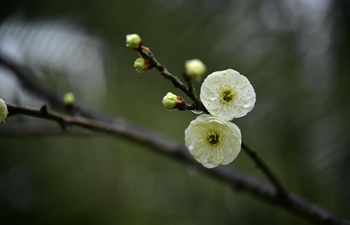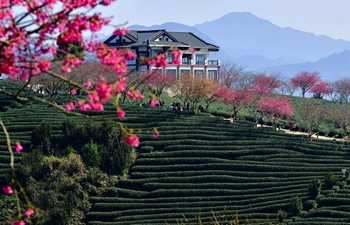
A Syrian farmer puts harvested olives in a plastic box in a grove in the countryside of Sweida province, Syria, Nov. 13, 2018. The production of olive and olive oil in Syria was affected in 2018 compared with previous years, due to bugs in olive groves, high temperature and violation to the farmlands. In previous years, the average production of olive was estimated at around 1 million tons, while in 2018 the production plunged to around 700,000 tons.
DAMASCUS, Jan. 26 (Xinhua) -- The production of olive and olive oil in Syria was affected in 2018 compared with previous years, due to bugs in olive groves, high temperature and violation to the farmlands.
Mohammad Habo, director of the Olives Office at the Ministry of Agriculture, told Xinhua that in previous years, the average production of olive was estimated at around 1 million tons, while in 2018 the production plunged to around 700,000 tons.
"The olive trees have been affected as any other tree in Syria by the current crisis as a result of the violation to the farmlands which caused a shrinkage in the olive groves," he said.
The official said that the Agriculture Ministry will implement plans to fix the olive groves in Syria to restore the production to normal levels, particularly after the Syrian army restored large areas across the country and the battles have largely declined.
"The Agriculture Ministry will work to put plans to restore and fix the groves that were sabotaged as a result of the war circumstances in Syria and to secure the demands of seedlings to facilitate the cultivation of these spaces," Habo noted.
Despite the reduction in the production, Habo said that local consumption of the olive and olive oil is sufficient, noting that there is a space for exports, whose revenue will be crucial in the development process in Syria.
He said in 2018, 27 tons of olive oil were exported to 33 countries.
"We are still consuming our production of the olive oil and we export to other counties in relatively good quantities. The Syrian olive oil is considered as one of the famous oils in the world due to its unique characteristics in terms of the flavor, color and smell," he said.
He noted that Syria has large olive groves to produce the famous Syrian olive oil, which is ranked the seventh internationally.
The space of olive groves in Syria is estimated at around 692,000 hectares with 102 million olive trees, out of which 82 million trees are fruitful, he said, adding that in 2018, "our production was estimated at 700,000 tons of olive and our production of oil was estimated at 120,000 tons."
As for the farmers, the bad harvest was also complained about.
In Sweida province, Nizar Seihnawi, who has an olive grove in that province, told Xinhua that he felt the difference in 2018 in comparison with previous years.
His workers at the olive field were picking and collecting the olives from trees but the amount appeared far from abundant.
"The harvest was little as most of the trees were not productive. In 2017, my production of oil was estimated at between 400 and 500 liters, but in 2018 it was a quarter of the previous year's quantity. We hope that in the next years the harvest will be better," Seihnawi said.
Last September, the government-run al-Baath newspaper speculated that the harvest of olive would be affected in 2018, saying the bugs and infections that hit the olive trees were "catastrophic."
It said the big difference in the temperature between the day and night had contributed to the appearance of bugs that feed off of olive trees and cause olives to fall down ahead of its time.
The paper said the available pesticides could not help in killing the bugs, which caused a condition called "olive tuberculosis."
In the town of Masyaf in central Syria, which is one of the important places for olive groves, al-Baath said the production of 2017 in that area was estimated at 63,000 tons while in 2018 the production was only half of the normal figure.















